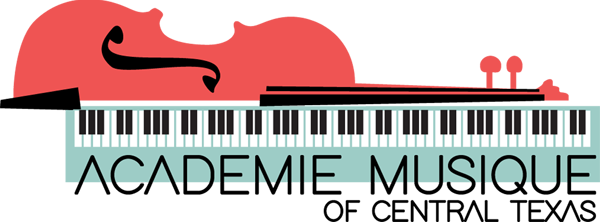Suzuki Groups & String Ensembles
 The Academie Musique offers many different ensembles, or musical groups, which contribute to the growth of all musicians. Students must participate in their school ensembles to participate in Academie Musique orchestras or choirs. Academie Musique ensembles are not to replace, but rather to enrich the opportunities students have in school, giving them the opportunity to work with other talented musicians from throughout the Central Texas area in various performance venues.
The Academie Musique offers many different ensembles, or musical groups, which contribute to the growth of all musicians. Students must participate in their school ensembles to participate in Academie Musique orchestras or choirs. Academie Musique ensembles are not to replace, but rather to enrich the opportunities students have in school, giving them the opportunity to work with other talented musicians from throughout the Central Texas area in various performance venues.
Lois Reiter ~ Associate Director of Academie Musique and Director of String Studies.
Suzuki Group Classes

Suzuki group classes are required for all students studying with a Suzuki teacher from Pre-Twinkle (beginners). Virtuoso Violinists, our downtown strolling violinists and violists will be the Suzuki class for advanced players.
There will be a formal concert each fall and spring to showcase the Suzuki groups.
Dress For Formal Concerts:
Black slacks/skirt; white dress shirt/blouse
Dress for Informal Concerts:
Academie Musique T-shirt; black jeans or skirt
Why Suzuki group class is so GREAT!
Playing as part of a group imitates a real performance. Students learn to play with others around, listening and feeling more at ease with the idea of sharing music with others. Later in life, the skill of performing or talking in front of a group will be more natural.
Playing in a group increases flexibility because students are asked to play at a wide palate of speeds or different dynamics than they do just by themselves. Learning to be in a group and follow something different than each person’s idea creates a better world.
Playing in group reinforces a steady pulse, and more importantly not stopping for a mistake, following others, being a leader. This strengthens review pieces so that the students are better prepared with greater skills to move on to higher levels. Learning to be prepared and how good it feels will aid students to be prepared for other subjects.
Playing in a group creates community. Children are encouraged when they see another child doing well, and know they can also do the same thing. It’s hard for a child to believe they can do it when they mainly see adults playing well. Children learn from their role models, the other kids.
Any memory slips are covered by the other players with no embarrassment. Mistakes are taken in stride. The ability to play on after a mistake is exercised so that mistakes don’t trip the students up. An occasional mistake is not the end of the world.
Group playing widens the music, brings different sounds, feelings, and expressions than playing alone. There is more than one way to play or think or write.
Playing in a group makes it more fun to review. Children don’t often play their review pieces enough, but for a group concert, they will and be more interested in doing a good job. As adults, we know how much easier it is to exercise with someone else or a group than alone.
Playing games in a group setting renews and refreshes the music, and it becomes more alive and more relevant to them. Often children think they are playing loud enough, or soft enough. Through group playing, they learn by example just how loud or soft.
Children learn in a group to happily follow a leader and still be themselves. Following without feeling a loss of identity helps students be strong enough to learn from others, and give the leader respect.
Children hear the next pieces that the others are playing and feel more motivated to practice. When children arrive at group class, they hear where they have been, and where they are headed. This gives them pride in their accomplishments and momentum to go even further.
We foster a cooperative spirit in a group class. We are all there encouraging each other, helping each person to learn. Learning is enhanced by a non-threatening or too competitive environment.


